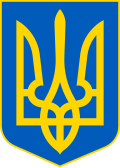First Yanukovych Government | |
|---|---|
| 9th Cabinet of Ukraine (since 1990) | |
 | |
| Date formed | 21 November 2002 |
| Date dissolved | 5 January 2005 |
| People and organisations | |
| Head of state | Leonid Kuchma |
| Head of government | Viktor Yanukovych |
| Deputy head of government | Mykola Azarov |
| No. of ministers | 20 |
| Member party | Party of Regions Social Democratic Party of Ukraine (united) Labour Ukraine |
| Status in legislature | Majority |
| Opposition party | Our-Ukraine Yulia Tymoshenko Bloc |
| Opposition leader | Viktor Yushchenko Yulia Tymoshenko |
| History | |
| Legislature term | 5 years |
| Predecessor | Kinakh government |
| Successor | First Tymoshenko government |
 |
|---|
The first Yanukovych Government was the Ukrainian cabinet of ministers between 21 November 2002 and 5 January 2005, led by Prime Minister Viktor Yanukovych. Yanukovych had been elected Prime Minister of Ukraine with 234 votes, only 8 more than needed. [1]
On December 1, 2004 (during the Orange Revolution) the Ukrainian Parliament passed a vote of no-confidence. [2] The government supported NATO membership of Ukraine (2002) and sent Ukrainian troops to Iraq in 2003. [3]


